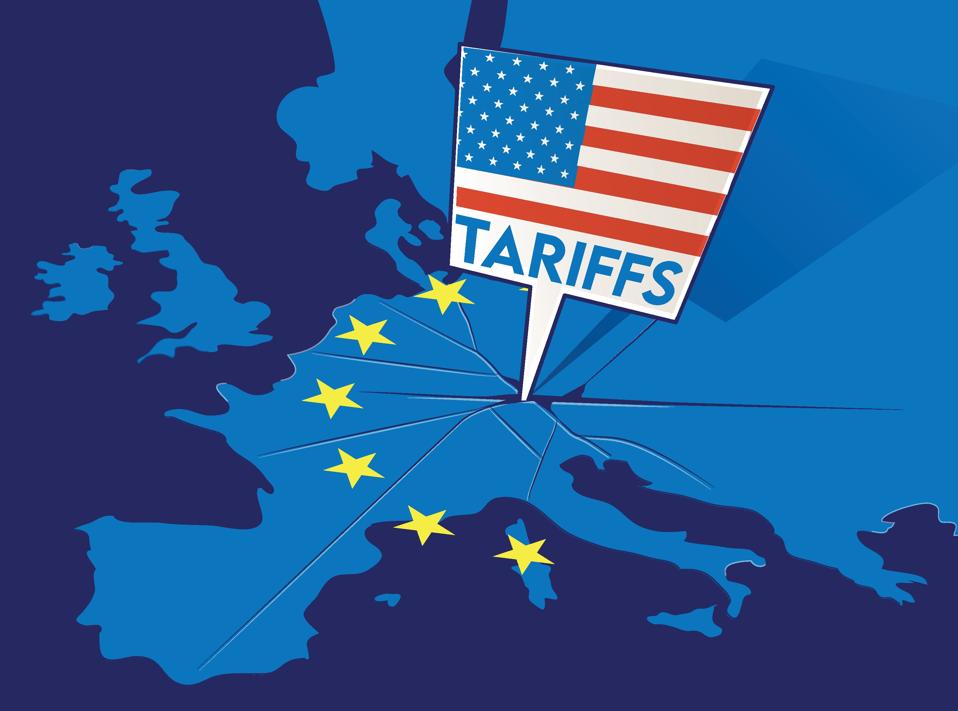Volkswagen and Stellantis, the two power-houses dominating European auto sales, reported worrying financial developments Thursday, as current bland business conditions were set to be shaken up by another possible chip shortage. Adding to the pressure, the U.S. tariff regime is also producing some scary bottom-line outcomes for investors.
Volkswagen shares rose initially on news of a third quarter loss, but slipped during the day to €91.65, down 1.7%. Stellantis shareholders were also spooked by news of possible unspecified losses and the shares lost nearly 9% at €8.85.
Volkswagen and Stellantis together with their long lists of brands, account for just over 40% of Europe’s annual sales of sedans and SUVs. In the first nine months of 2025, Volkswagen and its brands accounted for 26.7% or 2.65 million of European auto sales, according to the European Automobile Manufacturers Association, known by its French acronym ACEA. Stellantis was responsible for 1.5 million sales or 14.7%, according to ACEA.
Volkswagen reported a third-quarter operating loss of €1.3 billion ($1.5 billion) or 1.6% Thursday, hit by U.S. tariffs, and the turmoil at Porsche, which is suffering because it overestimated the market for electric vehicles. VW told an analyst’s briefing that U.S. tariffs will cost VW up to €5 billion ($5.8 billion) in 2025, with €1 billion ($1.2 billion) due to the impact of weaker profit margins and the balance in actual payments.
Nexperia problem could shut down production
Negatives from its subsidiary Porsche accounted for most of the loss in the quarter. Without the losses, the operating profit margin would have been 5.4%, VW said.
VW said its forecasts for 2025 remained unchanged, but that could change if the Nexperia chip shortage worsens. VW said its supply was assured for only a week. ACEA said this week European automakers may have to halt production within days. These chips are not the high-end type which caused such disruption during the 2020-2023 crisis. Chips made by Nexperia of the Netherlands are much more mundane and control functions like windscreen wipers or electric windows. But there are many more of them than the high-tech expensive chips.
There are between 300 and 600 chips like this in every modern car, U.S. trade group MEMA told Automotive News.
Nexperia makes most of its chips in China, and earlier in October the Chinese government blocked exports. The dispute with China concerns the ownership of Nexperia, and according to Reuters, the Dutch government believes it can settle the dispute with China.
VW said it was facing challenges because demand for EVs wasn’t increasing as quickly as hoped. Europe’s recovery from the Covid pandemic has left VW, and many of its competitors, with much unused capacity.
This has led to an outbreak of factory closures and temporary production halts by Volkswagen and Stellantis. Stellantis has introduced temporary shutdowns at six plants across Europe. Volkswagen has acted on a similar scale, with its EV production particularly impacted.
Stellantis expects unspecified one-time charges
Stellantis reported that sales rose in the third quarter by 13% to €37.2 billion ($43 billion), the first increase in sales for seven quarters. Stellantis only reports profits at the halfway stage and year-end. But investors apparently took fright at Stellantis’s bland words in the third quarter report that it expects to book one-time charges in the second half from changes to its strategic and product plans and a review of its warranty process.
Volkswagen brands include its own VW, Skoda, Audi, Seat/Cupra, Porsche, Bentley and Lamborghini.
In Europe, Stellantis has Peugeot, Citroen, Opel, Vauxhall, Fiat, Jeep, Alfa Romeo, DS, Lancia and Maserati. In the U.S. there is also Ram, Dodge, and Chrysler.

